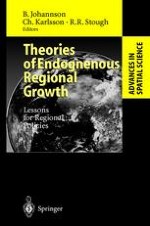2001 | OriginalPaper | Buchkapitel
Universities and Regional Economic Development: Does Agglomeration Matter?
verfasst von : Attila Varga
Erschienen in: Theories of Endogenous Regional Growth
Verlag: Springer Berlin Heidelberg
Enthalten in: Professional Book Archive
Aktivieren Sie unsere intelligente Suche, um passende Fachinhalte oder Patente zu finden.
Wählen Sie Textabschnitte aus um mit Künstlicher Intelligenz passenden Patente zu finden. powered by
Markieren Sie Textabschnitte, um KI-gestützt weitere passende Inhalte zu finden. powered by
Since the early eighties, resulting from major structural changes in modern economies, a new wave of regional economic development policies has begun to emerge both in the US and in Europe (Atkinson, 1991; Isserman 1994; and Osborne, 1994). While traditional approaches (i.e., “smokestack chasing” via providing attractive financial conditions and business climate for relocating companies) were suitable tools for boosting localities in the era of mass production, they are no longer appropriate in the age of technology-led economic growth when economic globalization and the preeminence of knowledge and information in production have given rise to a renewed importance of regions (Acs, 1998; Florida, Gleeson and Smith, 1994: and Scott, 1996). This new set of policies, called “self-improvement” (Isserman, 1994), or “high-performance economic development” (Florida, Gleeson and Smith, 1994) aims at advancing a region’s technology base and human infrastructure through the implementation of specific, technology related programs. In collaboration with the regional industry, governments support technology development, assist in industrial problem solving, provide start-up assistance, and help local firms finance new technologies (Coburn, 1995).
